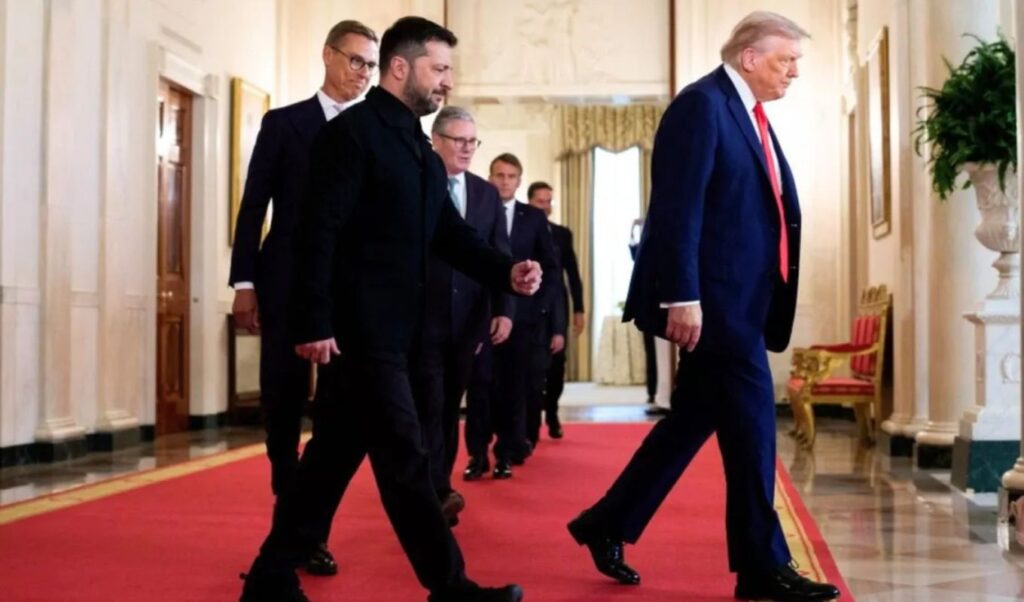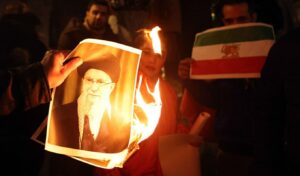Significant changes and a more acceptable plan for Ukraine emerged from the Geneva consultations, with attention now turning to the upcoming meeting between Donald Trump and Volodymyr Zelensky, while Moscow shows dissatisfaction with this new framework, launching fresh strikes against Ukrainian territory.
Levitt: No Putin-Zelensky meeting this week – Revised plan must be presented to Russians
The timing of the meeting between the American and Ukrainian presidents remains unknown. White House Press Secretary Caroline Levitt stated yesterday that no meeting has been scheduled for this week. She also told reporters that “talks to end the war in Ukraine are productive, but there are still some points of disagreement.”
According to Reuters news agency, Zelensky is ready to travel to Washington in the coming days to discuss with Trump the sensitive issues of the proposed plan to end the war in Ukraine. “The revised plan will need to be presented to the Russians again,” she added.
“The president wants to see this agreement completed and the war ended,” said the White House spokesperson, noting that Donald Trump has “put great pressure on both leaders.”
Zelensky’s message: Difficult to reach final text, will discuss sensitive issues with Trump
In his first statements after the Geneva talks, Ukrainian President Volodymyr Zelensky noted on Monday evening that “for now, after (talks in) Geneva, the points are fewer, no longer 28, and many correct elements have been incorporated into this framework.”
“Our team has already briefed today on the new action plan and this is really the right approach. The sensitive issues, the most delicate points, I will discuss with President Trump,” he added and emphasized that “there is still work we all need to do — it’s very difficult — to reach the final text. and we must do everything with dignity. We appreciate that the majority of the world is ready to help us and that the American side has a constructive attitude. Essentially, yesterday all day there were meetings, it was difficult, extremely detailed work.”
“Ukraine will never be an obstacle to peace – this is our principle, our common principle, and millions of Ukrainians expect and deserve dignified peace. We will do everything for this, we are ready to work as quickly as possible,” he concluded.
Coalition of the willing for Ukraine teleconference
Ukraine’s allies in the so-called “coalition of the willing” will hold a teleconference today, chaired by Keir Starmer.
The British Prime Minister stated that the alliance focuses on achieving “just and lasting peace.” “This is important for all of us, because the conflict in Ukraine has a direct impact here in the United Kingdom,” he added, as reported by Sky News.
Russia’s reaction: “European plan doesn’t work for us”
Russia appears not to accept the European counter-proposal to the 28-point plan, which has been criticized as particularly close to Moscow’s positions. “The European plan, at first glance… is completely non-constructive and doesn’t work for us,” Kremlin foreign policy advisor Yuri Ushakov told reporters in Moscow yesterday. President Vladimir Putin had stated on Friday that US peace proposals for Ukraine could serve as the basis for resolving the conflict, but that if Kiev rejects the plan, then Russian forces will advance further.
Putin expressed similar views regarding the 28-point plan in yesterday’s communication with his Turkish counterpart, emphasizing that the original US-Russian plan was “in line with discussions during the Alaska summit.” For his part, Recep Tayyip Erdogan stressed that Ankara “is ready to contribute to all diplomatic initiatives that facilitate direct contacts between the parties,” aiming for “lasting peace.”
War in Ukraine: Differences from previous 28-point plan – Territorial “thorn”, what’s planned for Kiev’s NATO membership
The original 28-point US-Russia plan was drafted last month by Kirill Dmitriev, Putin’s special envoy, and Trump representative Steve Witkoff. It called for Ukraine to withdraw from cities it controls in the eastern Donbas region, limit its army size, and not join NATO.
During Sunday’s negotiations in Switzerland – led by US Secretary of State Marco Rubio and Zelensky’s chief of staff Andriy Yermak – the plan was substantially revised.
It now includes only 19 points. Kiev and its European partners argue that the existing front line must be the starting point for territorial discussions. They also claim that land militarily captured by Russia cannot be recognized and add that Kiev must decide alone whether to join the EU and NATO – something the Kremlin wants to veto or impose conditions on.
Explosions in Kiev and parallel Ukraine-Russia attacks on energy infrastructure
Meanwhile, the war continues. Strong explosions were heard in Kiev early Tuesday, as reported by an AFP correspondent, shortly after air raid alarms were declared for Russian airstrikes essentially across the entire territory. The air force spoke via Telegram of “missile strike threats across all of Ukraine,” while Kiev military administration head Timur Tkachenko also referred to the danger of ballistic missile strikes. In a Telegram post, Klitschko also mentioned power and water supply cuts as a result of hostile activity. Meanwhile, the Ukrainian Foreign Ministry reported attacks against energy infrastructure in the early morning hours.
For its part, the Russian Defense Ministry announced that 10 drones heading toward Moscow were shot down yesterday, the day after the Ukrainian strike on a power plant near the Russian capital, as reported by ANA-MPA.
From 08:00 to 20:00 (local time, 07:00–19:00 in Greece), 50 Ukrainian drones were shot down in the Moscow, Bryansk, Kaluga and Kursk regions, the Crimean peninsula and the Black Sea, according to updates from the Russian Defense Ministry.
Moscow Mayor Sergei Sobianin said crews have been deployed to locations where drone debris fell.
The Ukrainian strike on a power plant in the Satura area, about 120 kilometers east of Moscow, forced authorities to activate backup systems to provide power to this city of 33,000 inhabitants, where bitter cold prevails.
Earlier today, regional governor Andrei Vorobiev reported that the Satura power plant’s operation had been restored.




